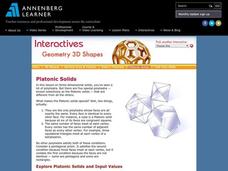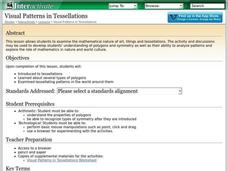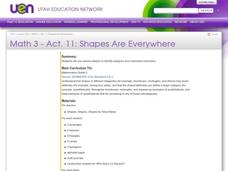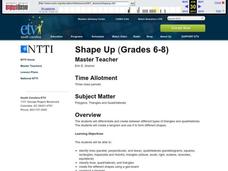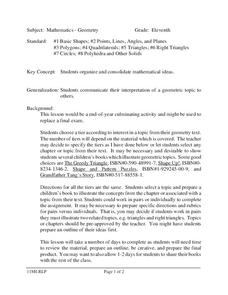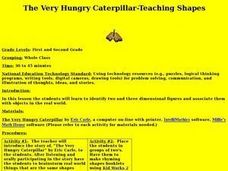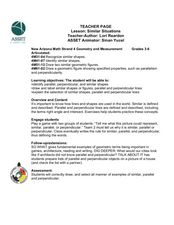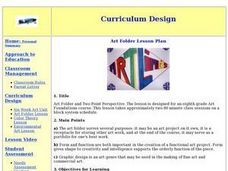Illustrative Mathematics
Finding Areas of Polygons, Variation 1
An exercise in finding the area of polygons by decomposing into triangles and composing into rectangles is the focus of this resource. Make several copies of the worksheet for each participant. Ask learners to use colored pencils to...
Annenberg Foundation
Geometry 3D Shapes: Platonic Solids
From polyhedrons to platonic solids, here is a lesson that will have your classes talking! As an introduction to platonic solids, scholars cut and fold nets to create the three-dimensional solids. They use an interactive component to...
CPALMS
2D Rotations of Triangles
Where does the line of rotation need to be to get a cone? Pupils respond to three questions involving rotating a right triangle about different lines. The scholars describe the solid created along with providing details about its...
Shodor Education Foundation
Visual Patterns in Tessellations
Geometers explore the concept of tessellations. They use a tessellation applet to manipulate shapes and design their own tessellation using the applet.
Curated OER
Mirror, Mirror
Geometry students use hinged mirrors to discover that the regular polygons are composed of triangles tessellating around a center point. They sketch triangles on paper models of the regular polygons having 3 to 10 sides and compute the...
Teach Engineering
New Perspectives: Two-Axis Rotation
Two-axis rotations ... twice the fun as one-axis rotations! The last installment of a five-part module teaches scholars how to conduct two-axis rotations. They create isometric drawings before and after the rotations.
Curated OER
2-D and 3-D Presents at Pedro's Party
Fifth graders draw 2-D and 3-D shapes. They sketch and label geometric figures with correct terminology, then explore parallel and perpendicular lines. Pupils sort and classify shapes drawn.
Curated OER
Mastering Math Vocabulary- The Three Bears
Integrate reading and math to increase your class' vocabulary. Read The Three Bears by Paul Galdone. Then have your third graders complete a worksheet containing math problems related to the story.
Curated OER
Shapes Are Everywhere
Third graders use various shapes to identify polygons and understand symmetry. They explore pattern blocks noticing their similarities and differences, then share with other team members. They draw 3 polygons in their journals and...
Curated OER
Shape Up
Middle schoolers explore differents types of triangles and quadriaterals. In this polygon lesson, students model identify and compare two and three dimensional geometric figures. Middle schoolers create tangrams and discover the...
Curated OER
Shape Hunt
Young scholars explore two-dimensional and solid shapes. In this shapes and patterns geometry lesson, students work with a partner to create identifiable objects using tangrams. Young scholars describe the attributes of their shape and...
Curated OER
Basic Shapes
Students create books about shapes. In this shape lesson, students select a topic such as points, lines, angles, planes, polygons, quadrilaterals, triangles, circles, and polyhedra. In groups, they create an illustrated...
Utah Education Network (UEN)
Create, Classify, and Sort Quadrilaterals
Quadrilaterals can be quirky! Fourth graders use geoboards and bands to create four-sided figures. They analyze the attributes such as angle size and presence of parallel sides. As a result they learn to differentiate among...
Curated OER
"Polly"gon Pockets
Explore polygons with your elementary learners. Divide the class in 12 to configure the polygon puzzle before them. They list the attributes of each type of polygon they see, and if there's time, they jump on the interactive website...
Curated OER
The Very Hungry Caterpillar - Teaching Shapes
Students identify two- and three-dimensional figures and associate them with real-world objects. In this geometry lesson, students are read The Very Hungry Caterpillar by Eric Carle and complete several activities including a chart...
Curated OER
Similar Situations
Students explore intersecting lines. In this intersecting lines lesson, students investigate shapes consisting of parallel, perpendicular, and similar lines. Students investigate these lines in shapes around them.
Curated OER
Recognize and Draw Shapes
What type of shape is this? Learners practice identifying shape attributes as they name a parallelogram and an oval and count the sides of a cube and a triangle. There are multiple-choice answers for the shape-name questions, so...
Curated OER
Crossword: Geometric Shapes
Using a word bank, mathematicians fill out a crossword puzzle using 9 clues. Each clue describes a shape, using details such as the number of sides, angle degrees, and the shape category. For example: "A quadrilateral with four equal...
Curated OER
Understanding Categories of Shapes
What are these shapes? Here are four shapes with some common attributes: they each have four parallel sides and four vertices. Scholars identify a rectangle, rhombus, square, and quadrilateral. Because there is an explanation written...
Curated OER
Understanding Categories of Shapes
What are these shapes? Scholars match seven shapes to their names: rhombus, sphere, square, cone, circle, triangle, and parallelogram. Although there isn't much to this activity, the shapes are nicely colored and it would...
Curated OER
Art Folder and Two Point Perspective
Eighth graders examine how to create a 3-D effect on a flat surface and draw in two-point perspective. They view and discuss elements of design, analyze artwork by M.C. Escher and Roy Lichtenstein, and design and create an art folder.
Curated OER
Geometry and Shapes in the X-36
Students describe, draw, and classify shapes. They use the internet to research the X-36 aircraft. Students identify the geometric shapes in the aircraft. They calculate the number of sides in an x-36.
Curated OER
Plane Shapes
For this early childhood plane shapes worksheet, students sharpen their problem solving skills as they solve 6 story problems.
Curated OER
Compare Plane Shapes
In this early childhood comparing plane shapes worksheet, students sharpen their problem solving skills as they solve 6 story problems.

